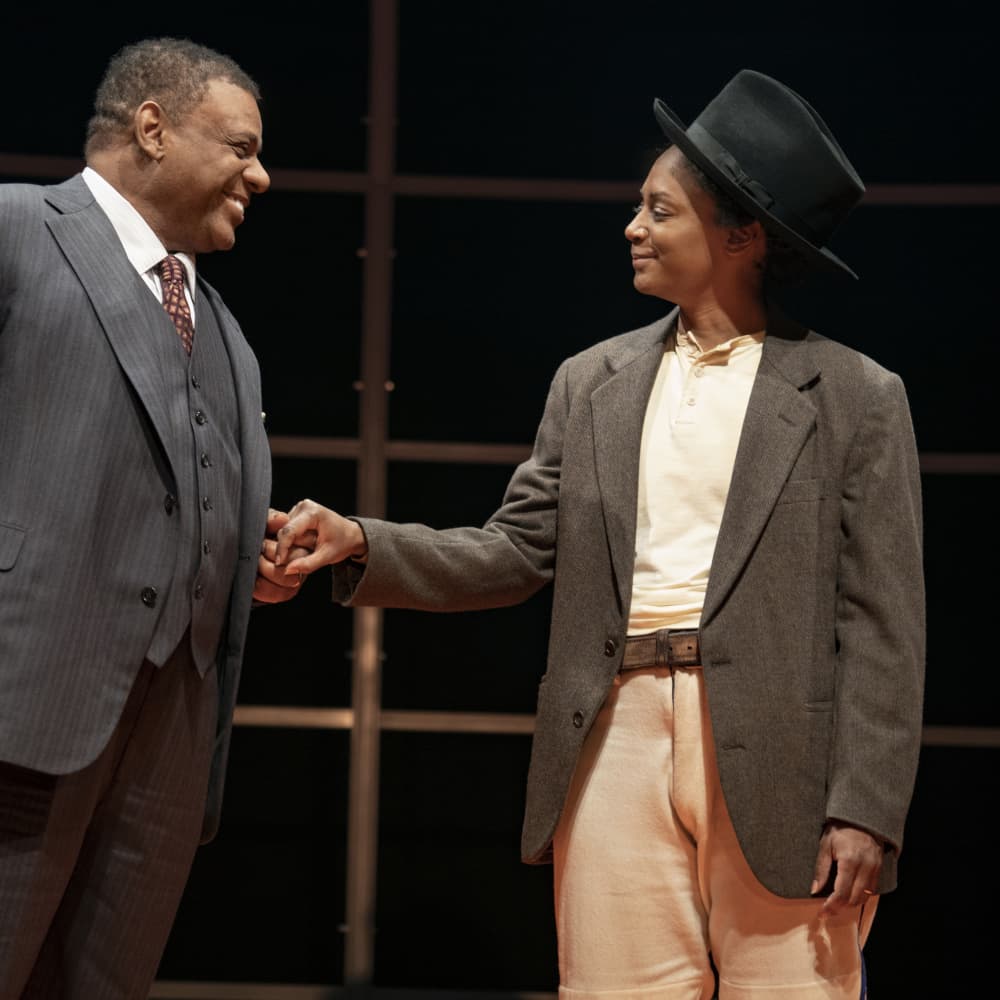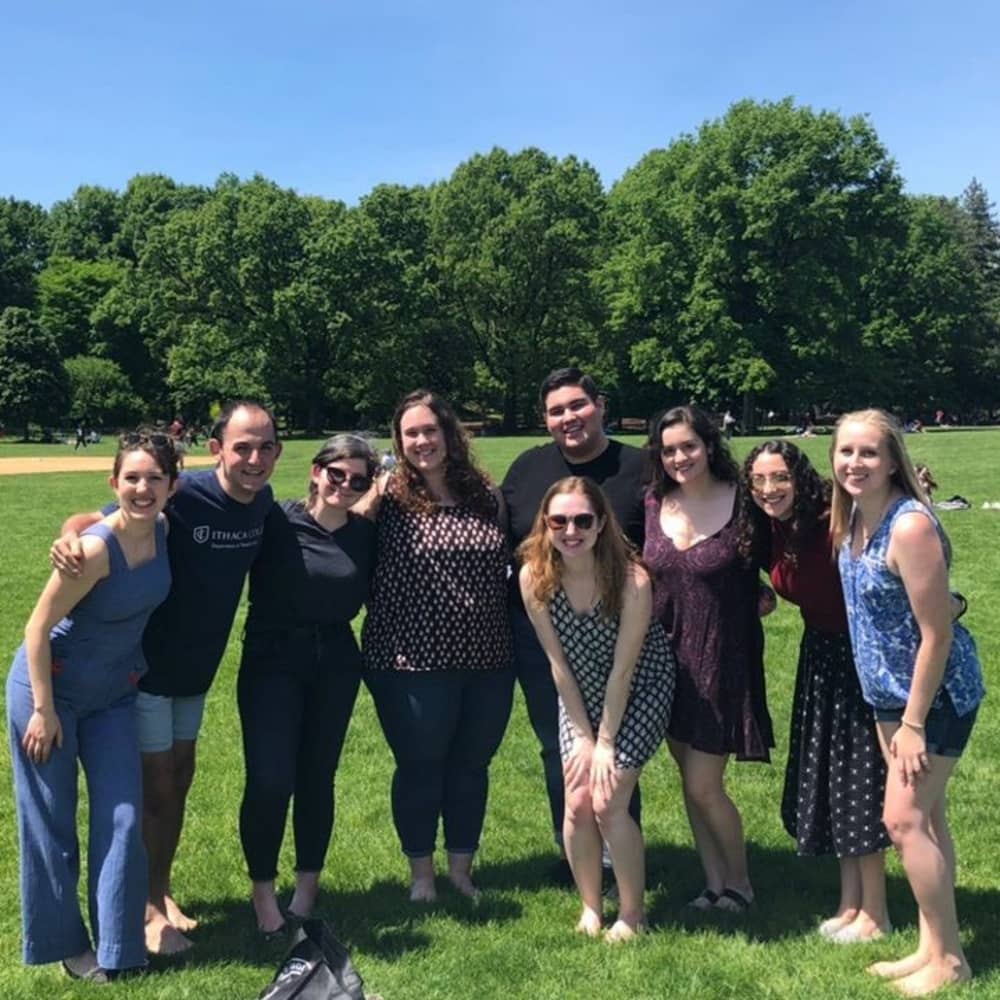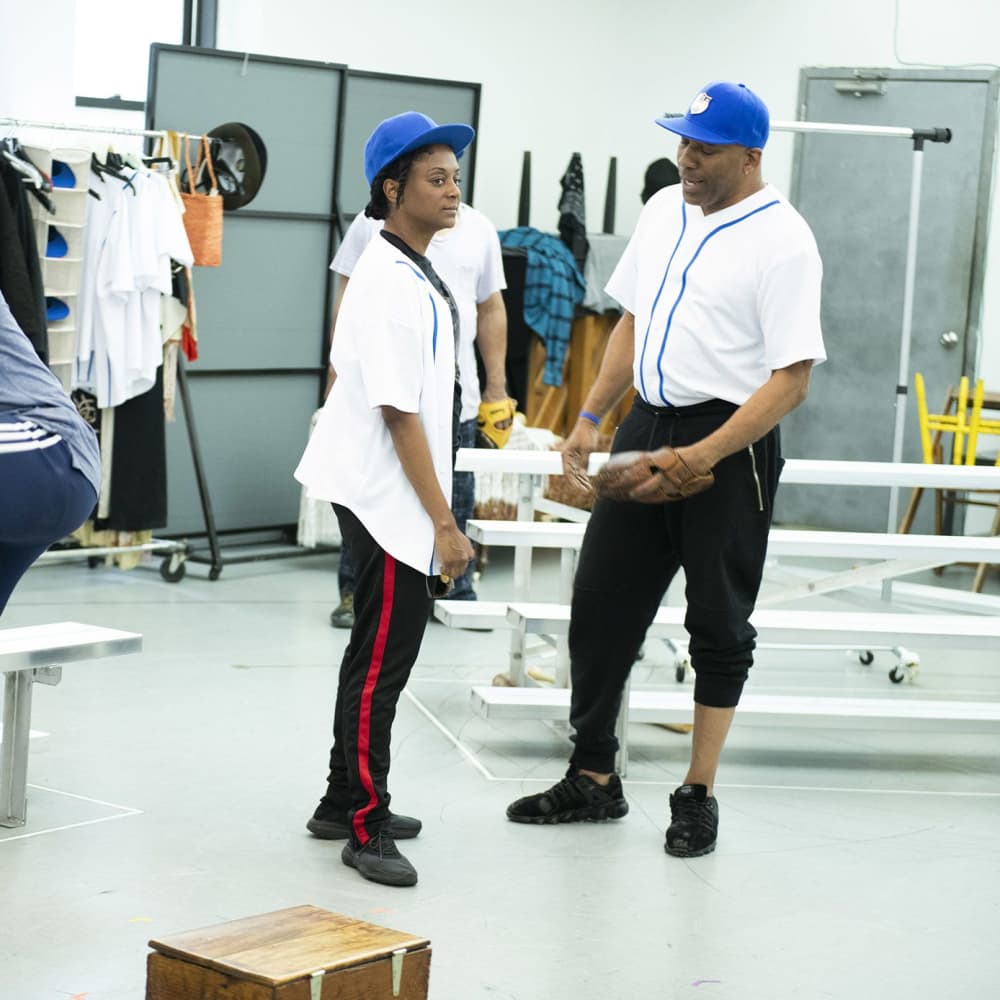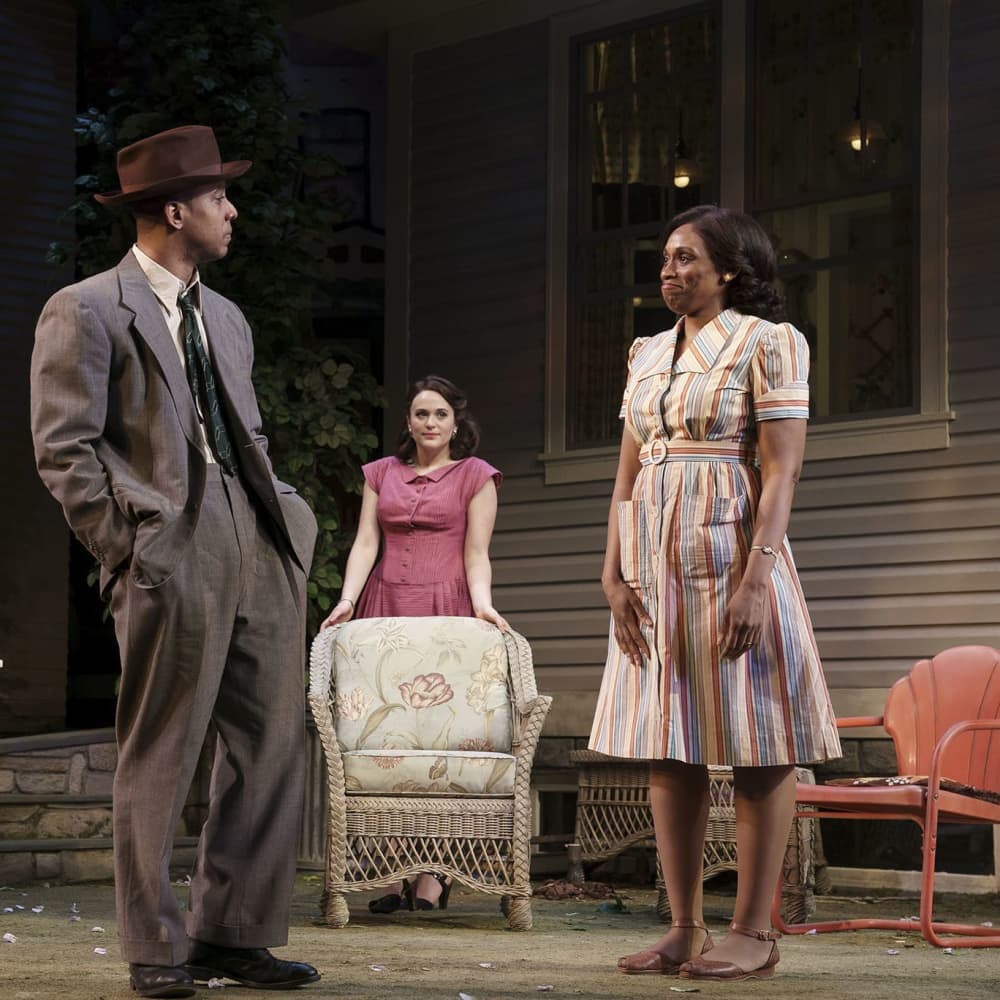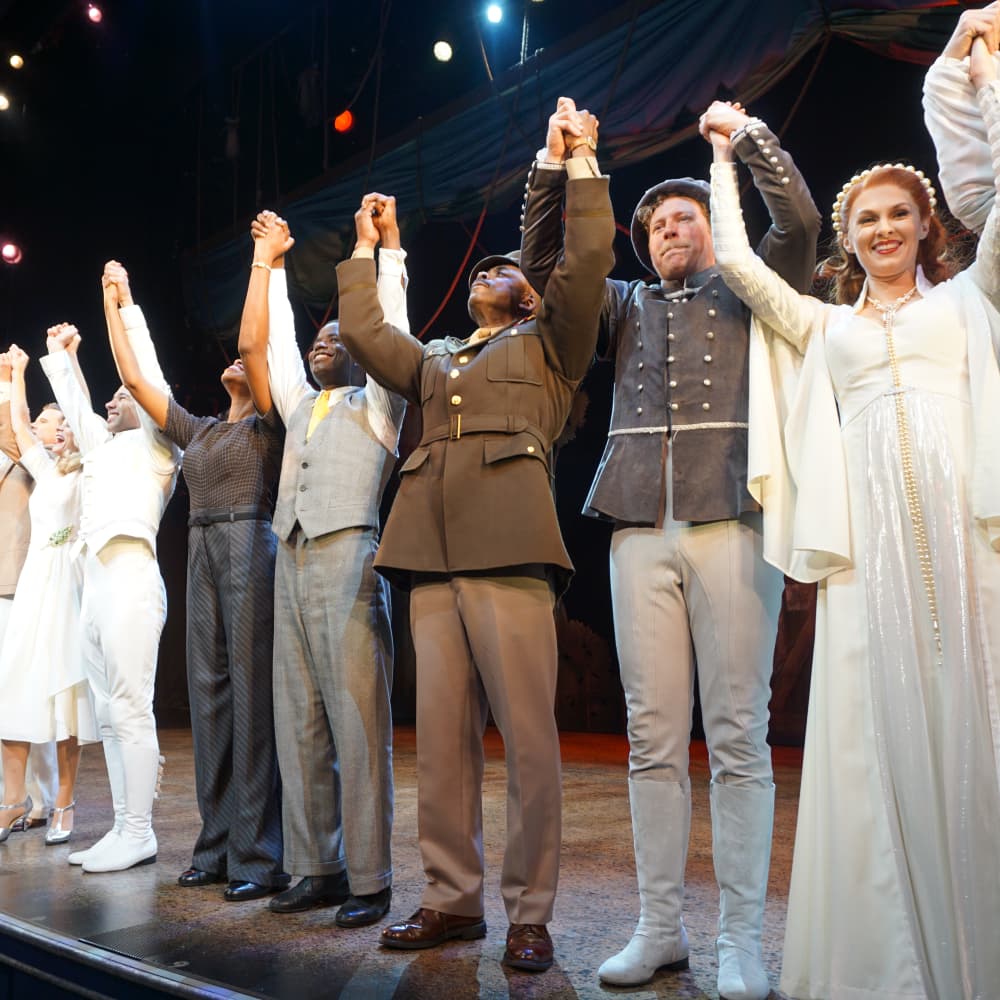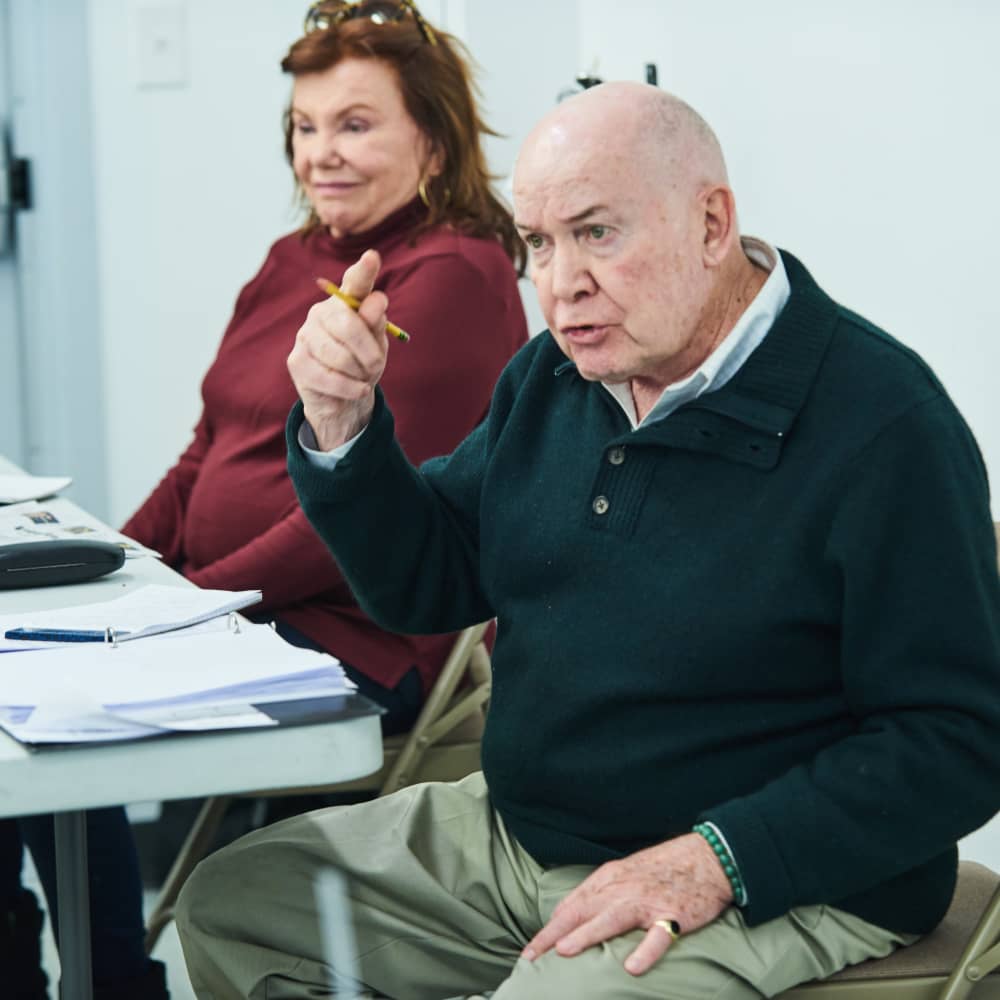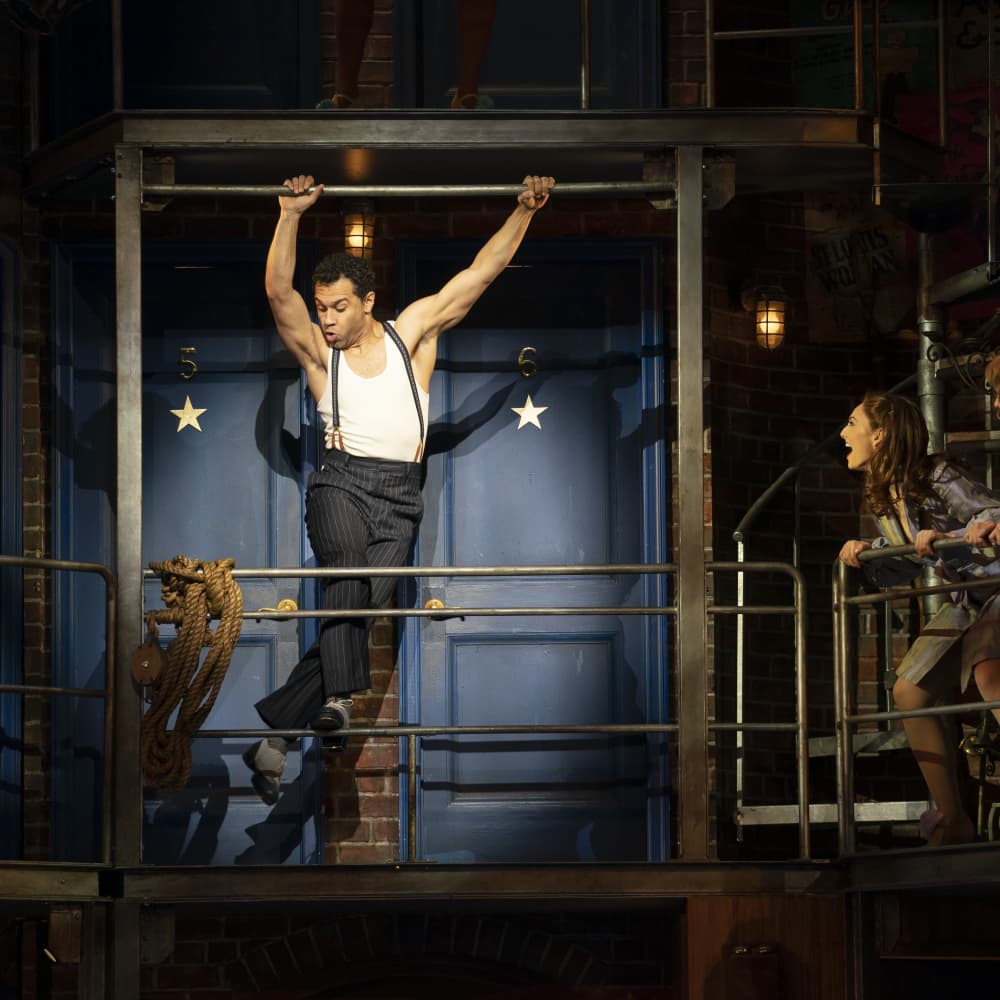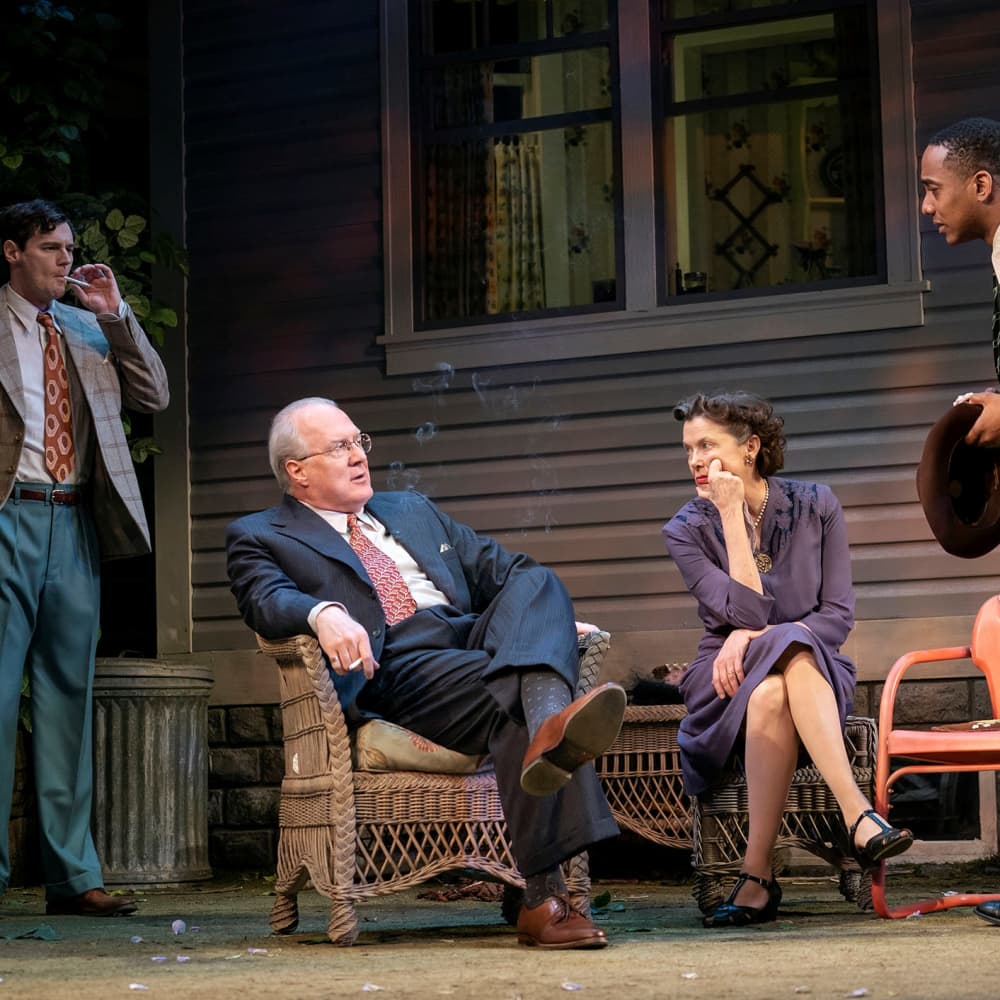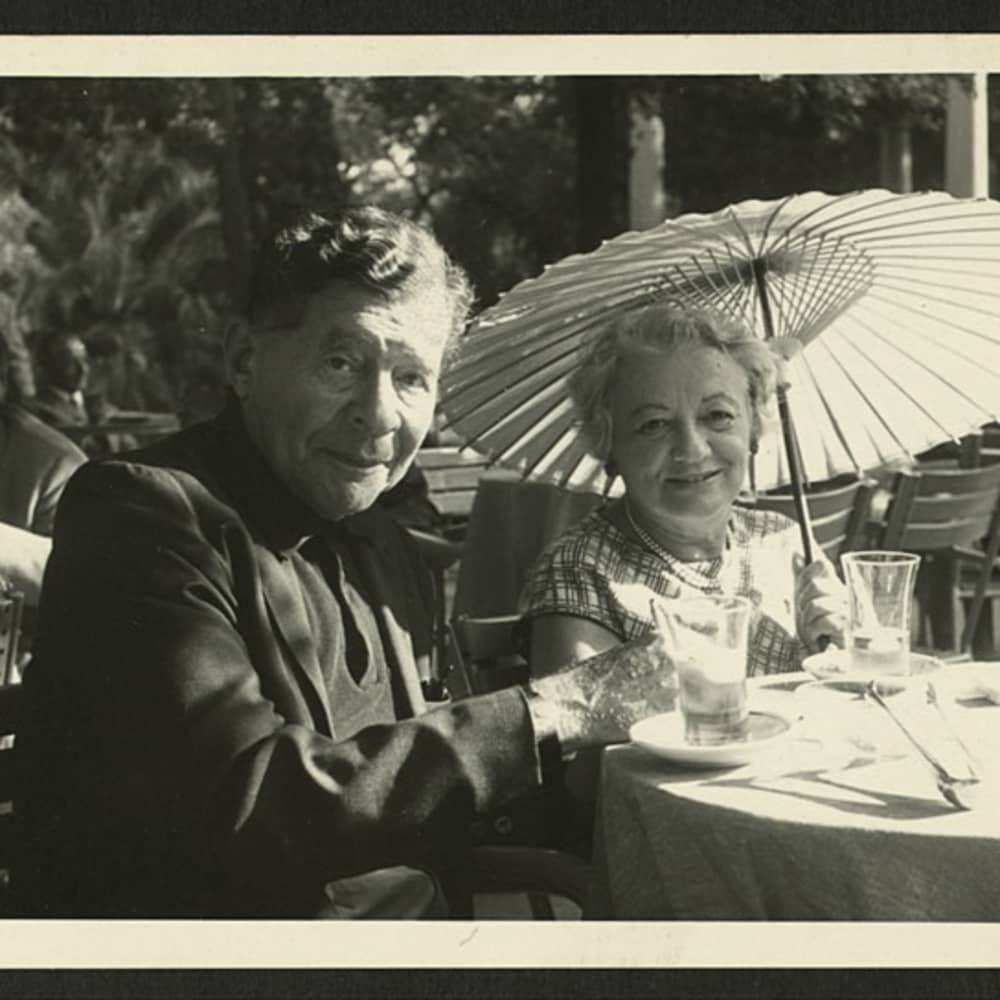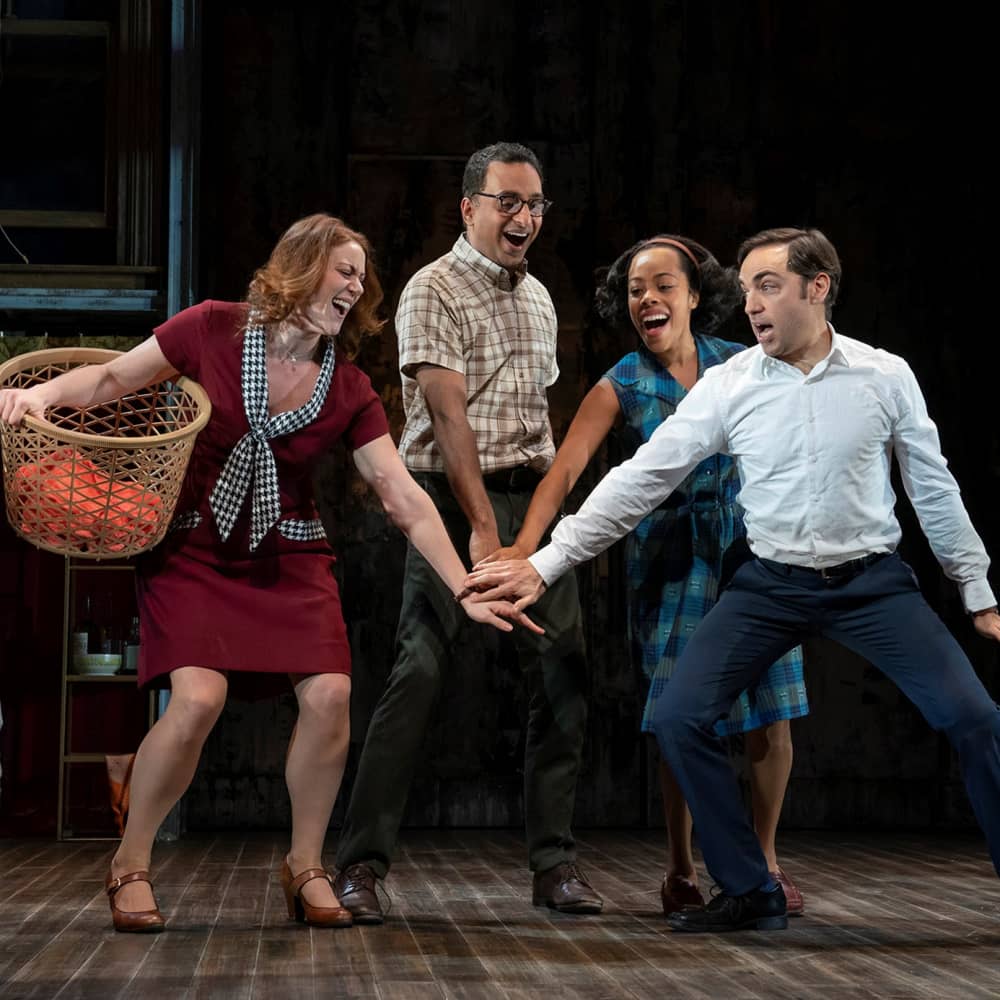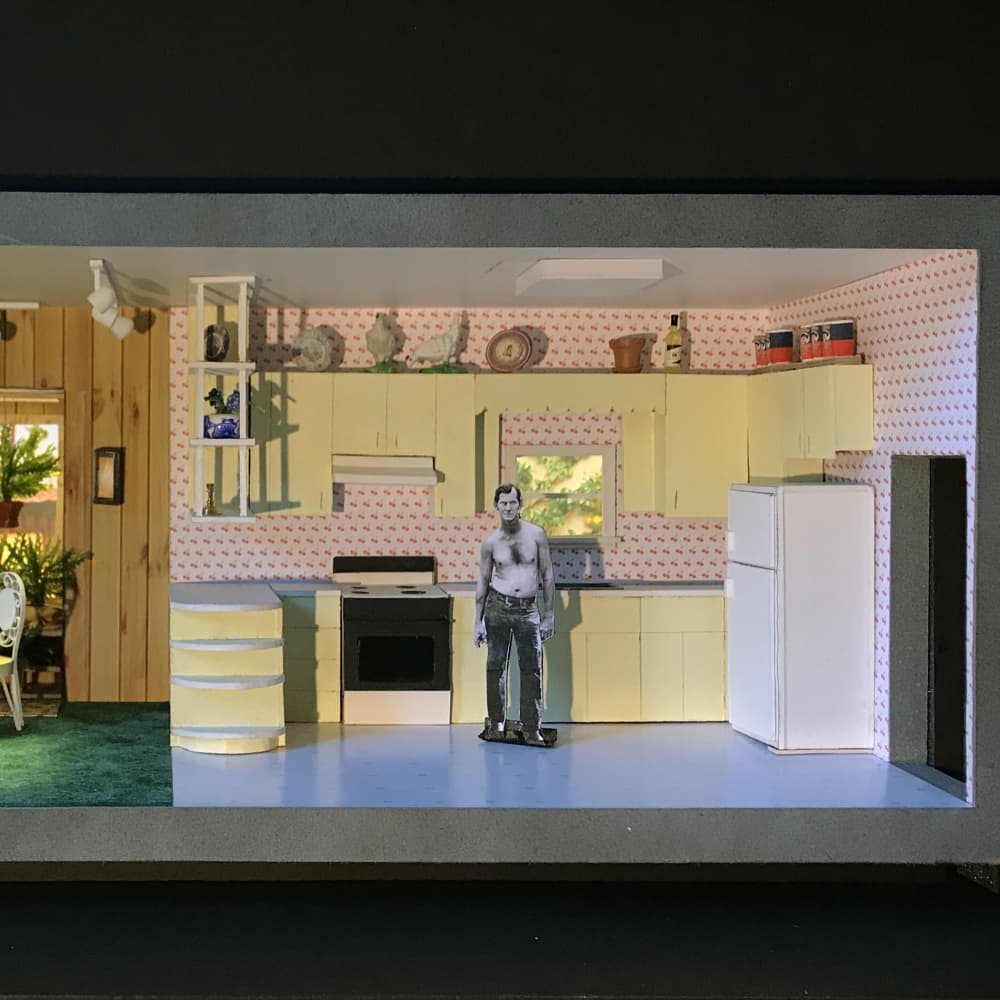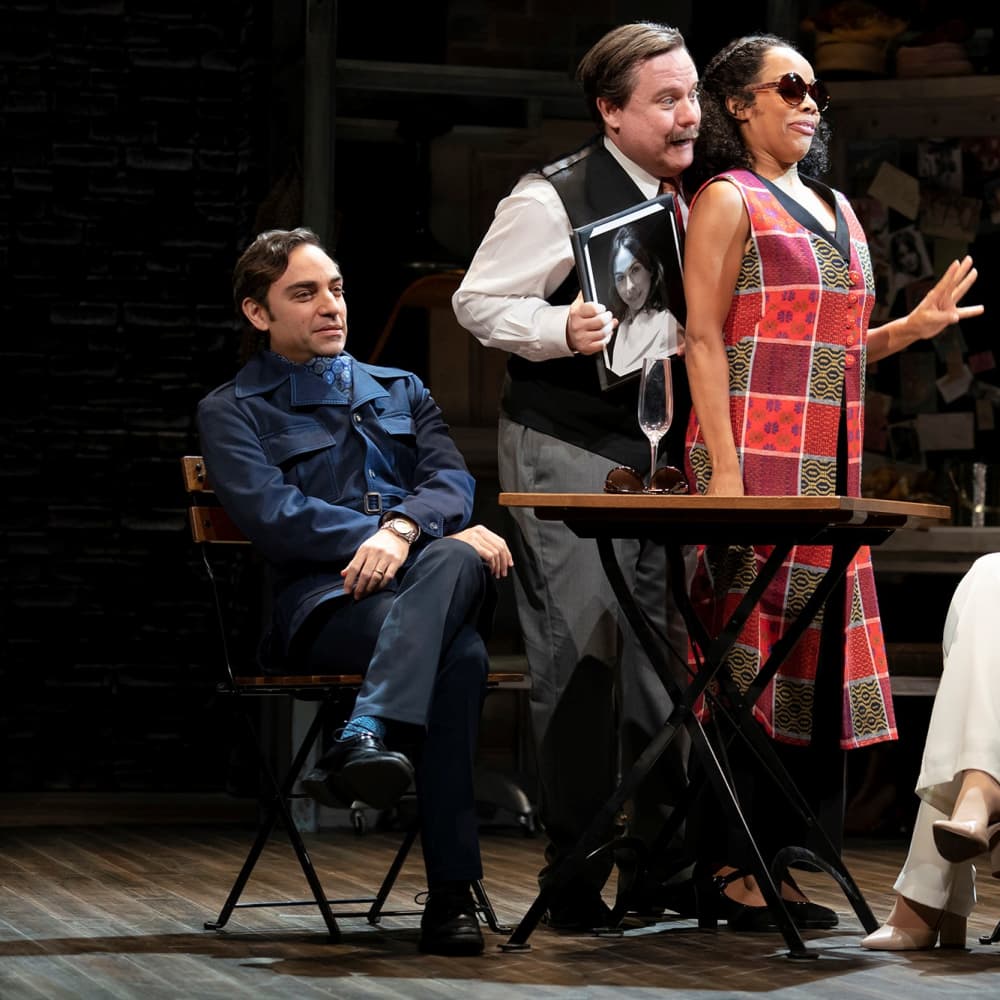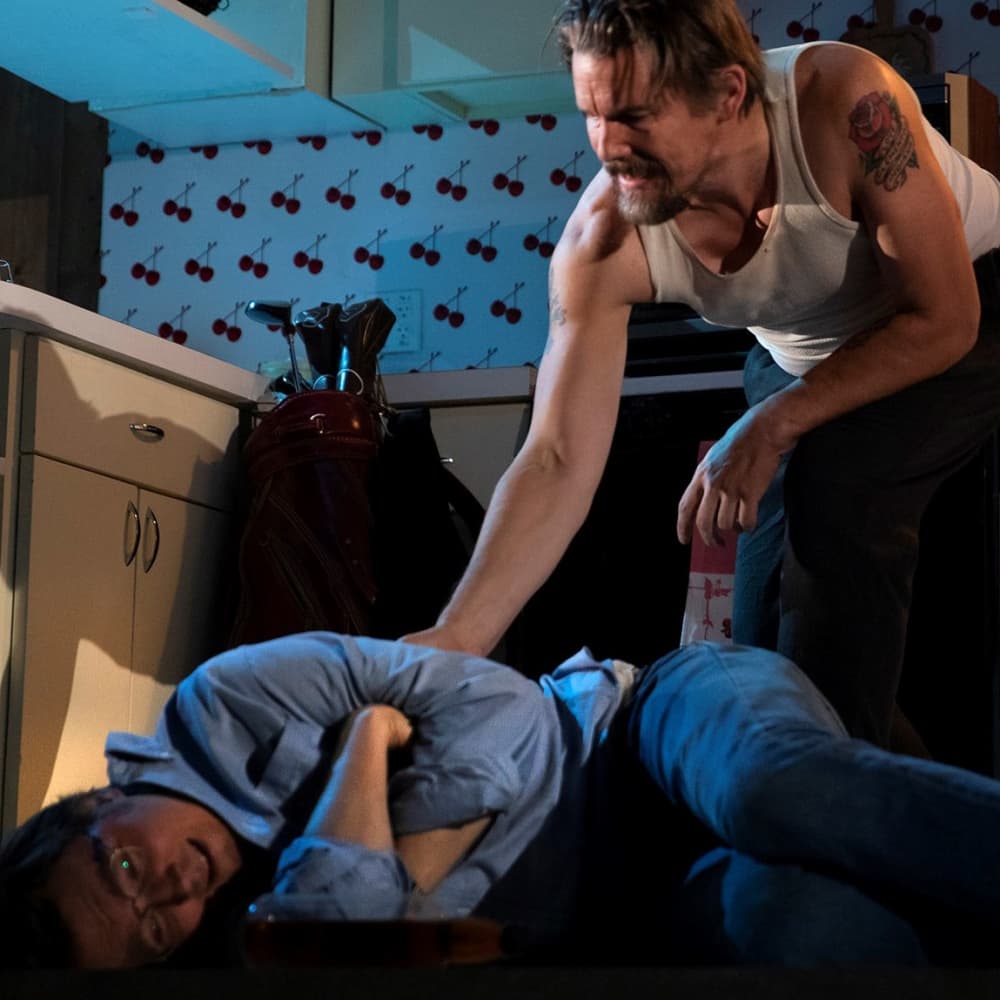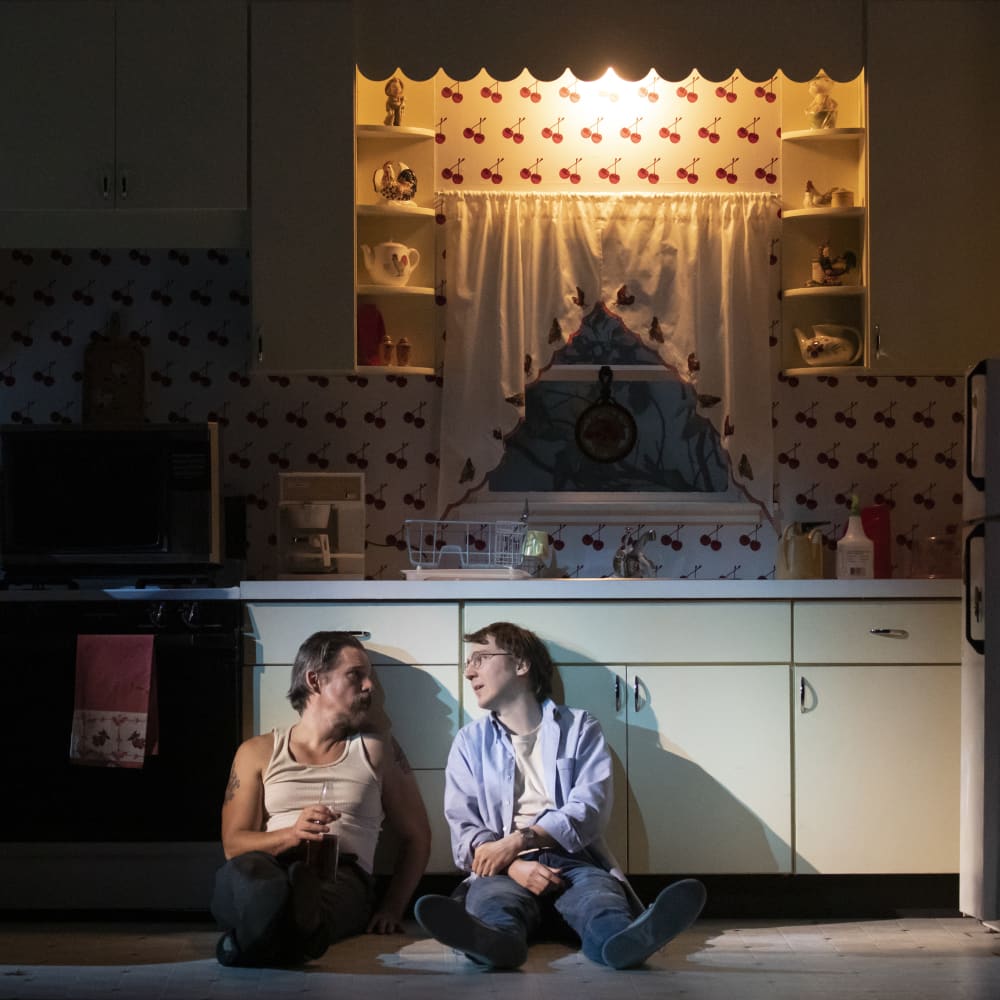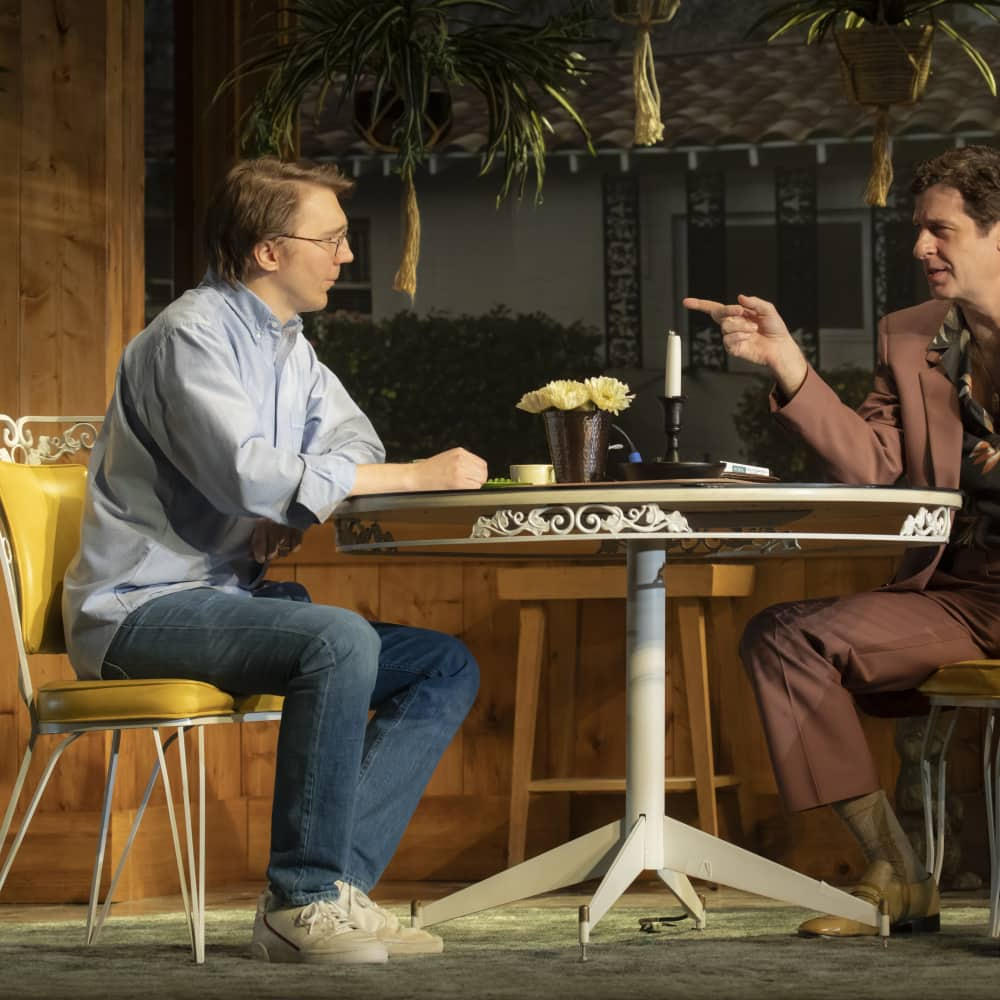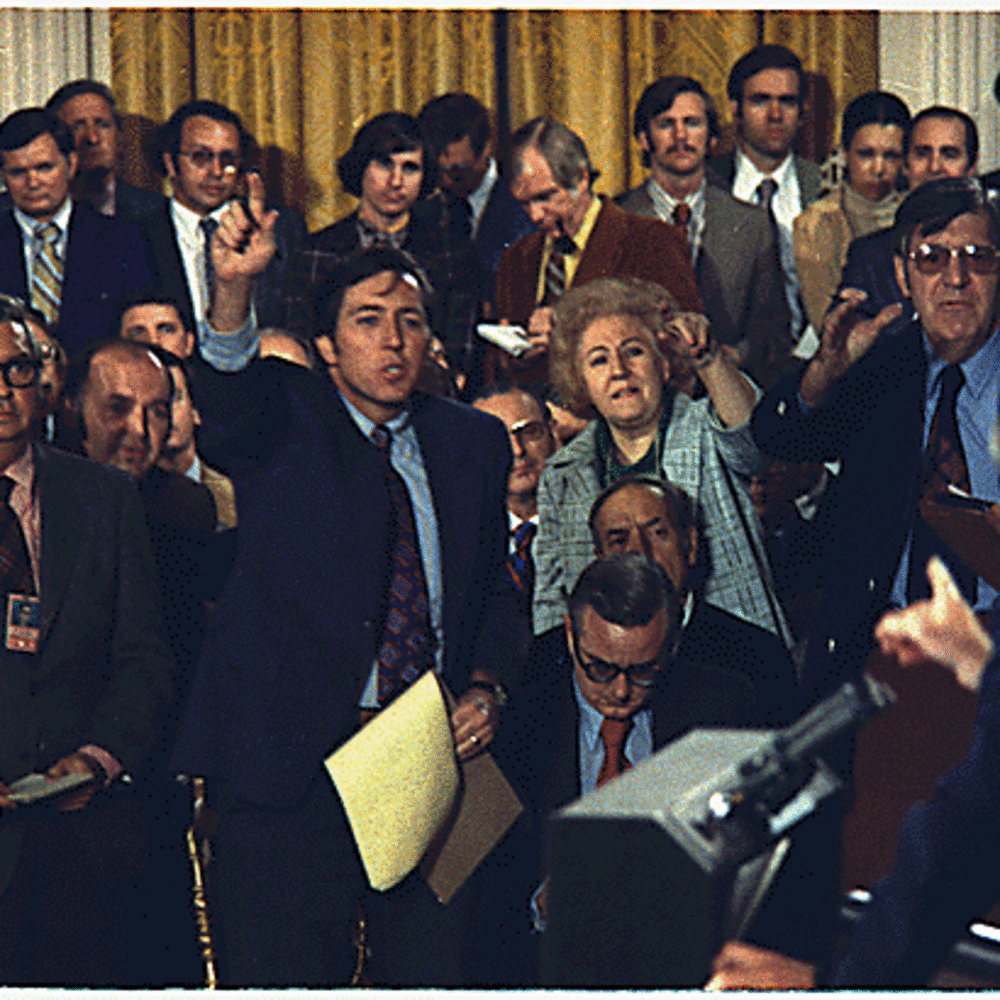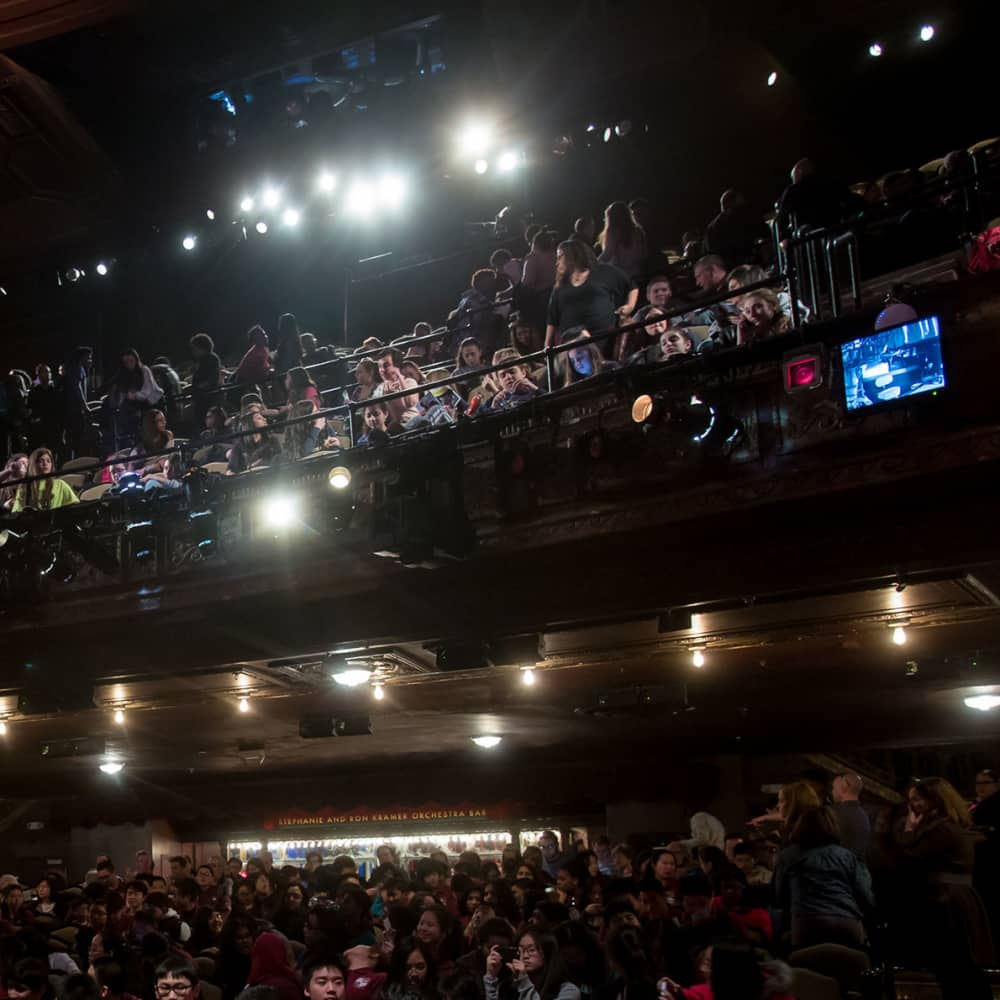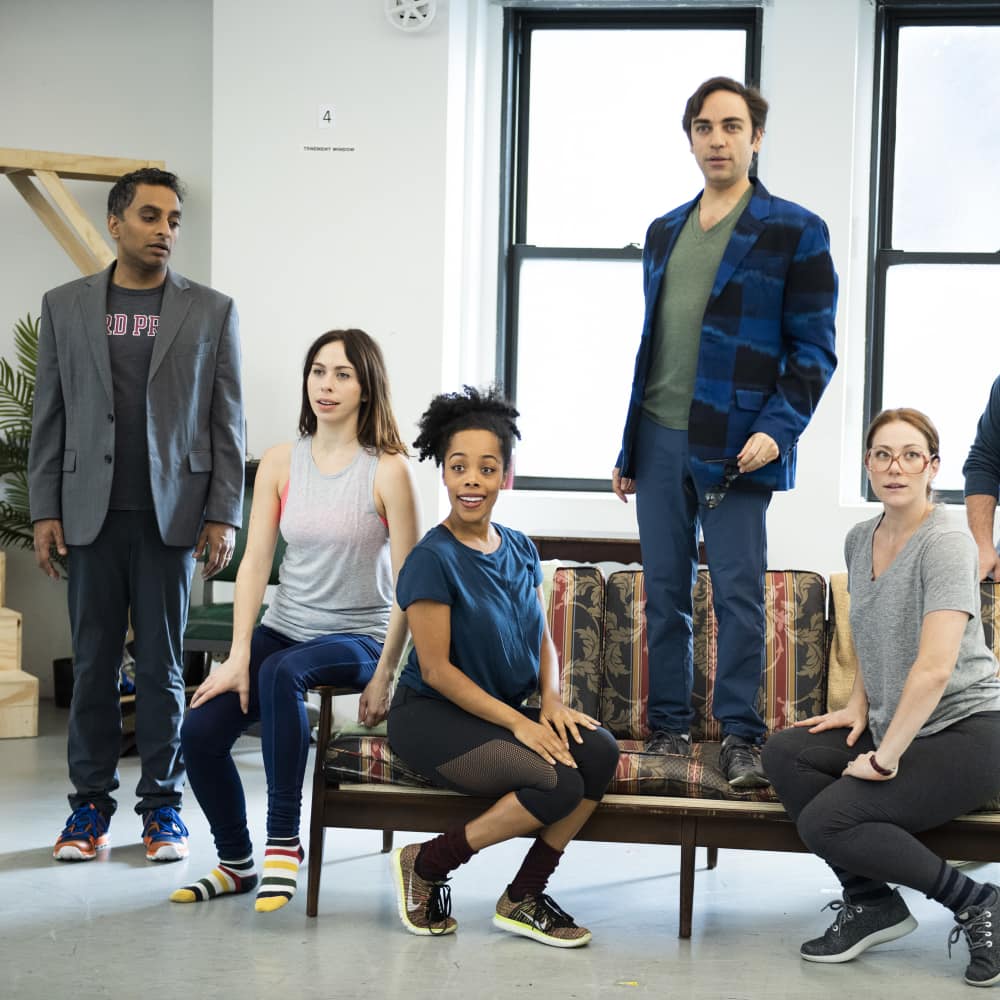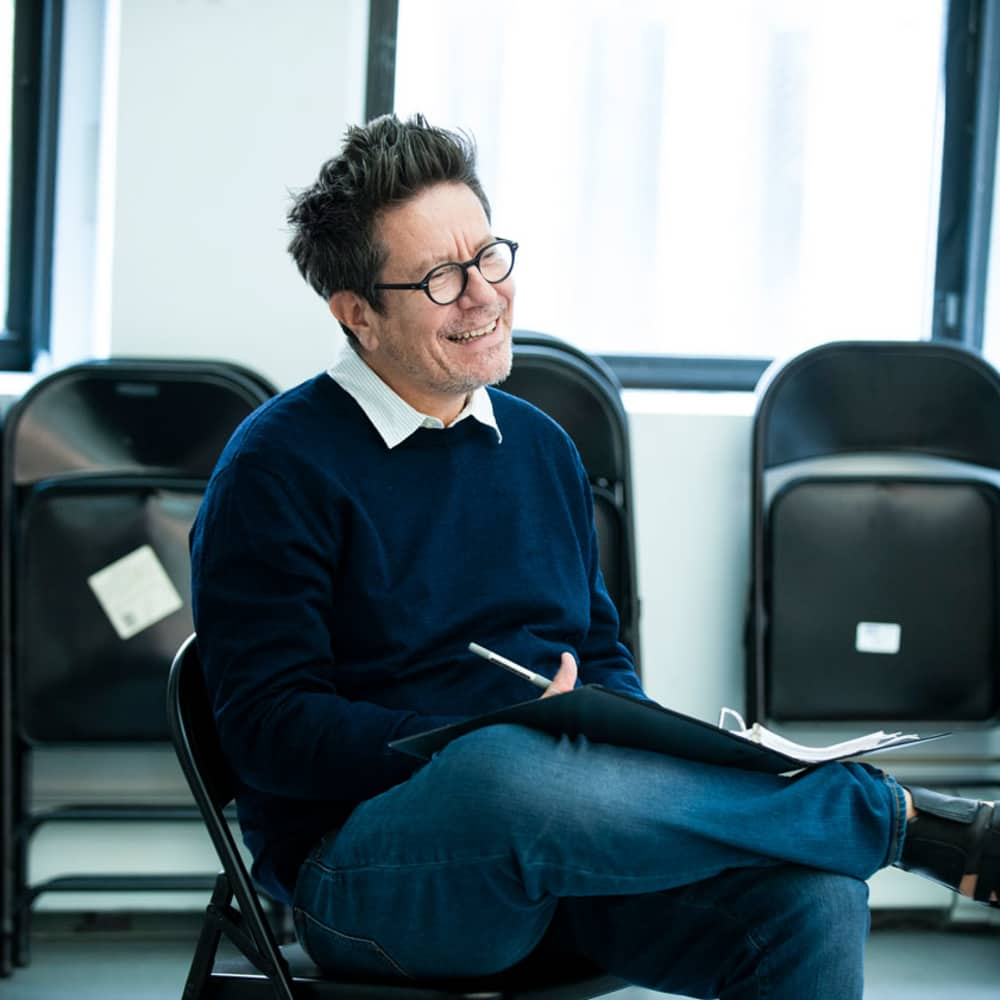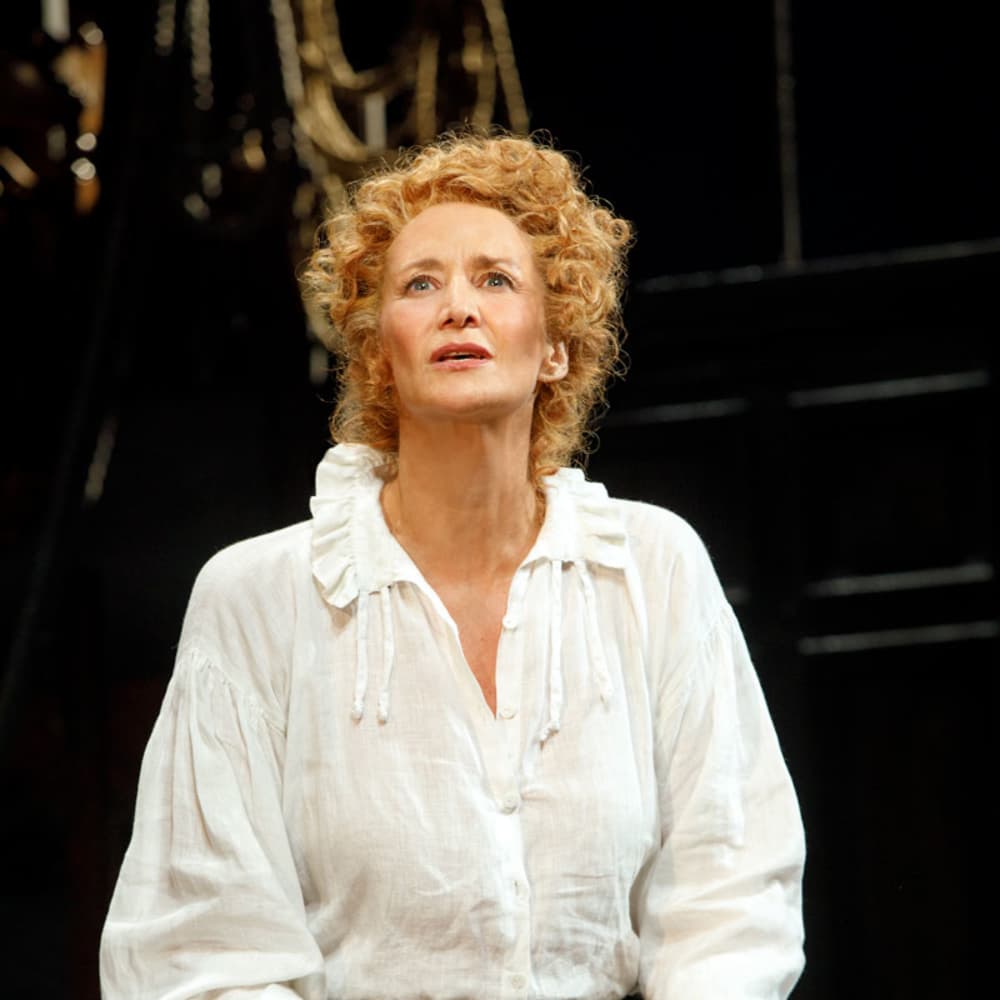True West:
A conversation with director James Macdonald
Posted on: February 19, 2019
On January 19, 2019, James Macdonald spoke about True West with education dramaturg Ted Sod as part of Roundabout Theatre Company’s lecture series. An edited transcript follows:
(There are spoilers below)
Ted Sod: James was educated at Oxford and the Le Coq school in Paris and he has directed so many different plays and operas here in New York and London, everywhere really. It’s quite phenomenal, the breadth of work you’ve done: new work, revivals, all of it. I want to start by talking about your working relationship with Sam Shepard, because the thing that really differentiates you from every other director who has directed a play by Sam is the fact that you directed him in a play as an actor when he appeared in Caryl Churchill’s A Number. What was it like to work with him? It seems to me that an actor can sometimes become very vulnerable.
James Macdonald: He was super vulnerable. We were playing in a small 200-seat theatre at New York Theatre Workshop and we designed the production to be like an amphitheater, like a medical operating theatre. The stage was about 15 feet across. He hadn’t been on stage since 1974 when he was in Cowboy Mouth with Patti Smith for three nights and that was his entire stage acting history. He was terrified and the audience was right on top of him, so that didn’t help.
TS: What was it that got you interested in his work? I know that you don’t take the easy way out. You would much rather direct a play that you don’t really know how to direct at the beginning and that challenges the audience in many different ways. What was it about his work that pulled you in?
JM: That’s exactly what his work does. During the early days, the 1960s, Sam was writing plays that were so bold formally and not psychologically constructed at all. They are brilliant, original pieces riffing off jazz and they are very musically put together. Then in the family plays of the ‘70s and early ‘80s, Sam took the O’Neill template and ripped it up and did something new with the whole idea of how family could be portrayed onstage. What is exciting to me is that his plays require such an intense level of performance from actors. It is theatrical in a way that no one before him had quite come up with. Albee comes the closest and has some of that kind of challenge to actors as well, but Sam rewrote the rulebook about what you could do on a stage in terms of energy, invention and pushing beyond realism as he does in this play.
TS: Edward Albee was very supportive of him early on in his career. He recognized the talent and said something to the effect of, “Sam is always experimenting. When you experiment to the degree that Sam Shepard is, you can fail largely and you can succeed largely.” I want to return to the “family plays” you mentioned that he wrote in more or less a decade. You are referring to five plays written between 1977 and 1985 starting with Curse of the Starving Class, and then Buried Child -- which won the Pulitzer Prize in ’78, I believe -- and then True West in ’80, Fool for Love in ’83 and the final play of that series, A Lie of the Mind in ’85.
JM: And The Late Henry Moss is also part of that cycle.
TS: I want to know more about your choosing this particular play. You have directed Fool for Love; Savage/Love, a play co-written by Sam and Joe Chaikin; and also a play that not many people know well, entitled Simpatico. What was it about this particular play that made you want to do it in New York at this time?
JM: The earlier ones I did, I did in my 20s and early 30s, so it was a long time ago. Coming back to his work once I’d gotten to know him better from working with him as an actor, it seemed True West was his best play. For me, it’s his purest play and his most personal play, and that made it the one I dreamed of doing. I got lucky that the rights were available and Sam was up for it and Todd Haimes, who runs Roundabout, was interested -- so I lucked out really -- and then sadly, in the interim, Sam passed and wasn’t with us anymore.
TS: I don’t know if everyone knows that Sam passed away in 2017 of ALS or Lou Gehrig’s disease. I’m curious about the personal part of True West. He’s made no secret of his father’s alcoholism. In the play, Austin has a beautiful monologue he delivers to his brother, Lee, about trying to save or help their father. I believe that Sam was responsible as a young person for his mother and sisters when they were living on the avocado farm that failed. Could you tell us a bit about why that personal connection is important in a play? It seems to me that it makes it so much more visceral for the audience when you know his own father was a confrontational drunk and had a short fuse, in Sam’s own words. How does that change your work, when a play is so personal?
JM: It just gives you a way of tapping into it. This process -- because Sam had died relatively recently and because Ethan knew him as well as I did, if not better -- became a labor of love. We would talk about how Sam was and how he behaved and the things about him that we happened to know and that actually helped us to construct the characters. Because in a way, although the actors have to play the brothers as completely different people, they are both aspects of Sam and that’s something that he profoundly believed. He believed that people are much more split than we often give them credit for. We all contain multitudes. That’s one of the things that the play argues.
TS: The play does this remarkable thing of having the brothers switch personalities. It also shows how easy it is for us to become savage. It feels as if he understood that part of our nature in a profound way.
JM: Alcoholism was in his family. Not just with his father but with his grandfather as well. He was acutely aware of it in his own family history and the danger of it for himself. It was something that haunted him.
TS: I also understand that you think that there is something very fundamental in the ten-year age difference between the two brothers. Can you talk about finding that dynamic between Paul and Ethan and their characters?
JM: Primarily, I got together a group of great actors to work on this, so all I needed to do is ask the right questions. The last production on Broadway very famously had the actors playing the brothers, Philip Seymour Hoffman and John C. Reilly, alternating roles. It was a great production directed by Matthew Warchus. But I thought I couldn’t possibly do that. To me, it was very intriguing this ten-year age difference between the brothers that’s in the script. What did it mean? That isn’t in Sam’s family at all. He had two sisters, but why did he write that? The more we looked at it and mined it, it’s the extreme power dynamic between baby brother, who’s the civilized brother, up against the older one, who is the savage one as it were. So the odds are really strongly stacked in different ways between the brothers and it just ramps up the tension between them. It gives baby brother much further to go in terms of getting even with big brother and, of course, he finally can’t help himself but to do that. Baby brother is naive and civilized and the journey that he makes towards being the savage, or one who is capable of violence, is more extreme. It’s a longer journey within the play and that gives Sam more work to do across the nine scenes in the play.
TS: It’s remarkable how two people from the same household can turn out so differently. How much of that do you think comes from the mother, because when she enters, you realize she’s on an entirely different planet than her two sons. She really doesn’t understand what’s going on with them and she still treats them like toddlers.
JM: Because they are behaving like toddlers. In a way, that’s the point. I think she’s somebody who has suffered for her whole life. I think Lee was probably a nightmare child who caused her extreme harm. She was married to an alcoholic who was rude, abusive and violent. So she lived in a war zone and Austin was her one salvation. The cultured son who did his exams, went to college and was a success. And she walks back into her house and Austin is like the other son and her husband now. He’s gone to the dark side. I think it’s a complete nightmare for her. I think Sam’s writing is much bolder than he is often given credit for in that scene in terms of imagining how insane it is for a woman to survive that much male violence and alcoholism. And what she’s done in response to that is built this fortress for herself. She’s built this beautiful house with locks on all the doors and windows that Lee can’t possibly burgle if his brother didn’t happen to be there with the keys to let him in. And she sees all that wiped out. So it’s a really dark story about how women have to cope with what we now often call toxic masculinity, that very dark side of the male psyche.
TS: The play really does resonate for today. I think if you saw it when it was first done in the early ‘80’s, you might think of the play as a war between two different ideological perspectives, but now, as things have changed dramatically in our world, it’s as if one doesn’t have much hope for the person who has intelligence, kindness and the patience to survive. It says more about how the forces of belligerence usually win out.
JM: It’s a very dark thing that the play is saying about Austin in particular. It really does relate to how these days, the cultured, literate person doesn’t believe in himself. He gets to the point where he utterly doesn’t believe that anything is true in the west or anywhere, which is the central debate in the play. The play asks what is truth and what is a lie. Austin decides he would rather live in the desert. He would rather drop out of society, live in the desert and give up his family.
TS: At the end of the script, there is a stage direction that says, “The two men circle each other.” Can you talk to us about the cinematic moment at the end you’ve chosen to present? I read that movies are a big part of your life outside the theatre and that movies help to inspire you when you’re directing revivals. Will you talk about getting from what’s asked for in the script to this ending, which is a cinemascope moment?
JM: The script is doing a huge riff on the business of writing a movie script and the narrative of the script relating completely to the brothers’ lives. Sam’s doing those parallels from scene to scene. So, it seemed interesting, particularly in response to how wide the stage is at the American Airlines Theatre, to do a wide-screen effect. We decided to do a frame that makes the audience think about how films are framed, so that you get that double image of the boys being in their own story, but also in the story that they’re writing. So, there’s a meta or fictional level to the end and the frame seemed to be a way of foregrounding that.
TS: I love the lit frame around the proscenium. When it flashes in our eyes, it prevents us from seeing what’s going on with the stage crew. I’m curious about this lit proscenium because I saw your production of The Father in London and there was also a lit proscenium. What inspired that choice? Does it have something to do with sleight of hand?
JM: I’ve done it on a bunch of plays now and I really should stop doing it. I promise this is the last time. It just seemed so right for this because Sam writes blackouts at the ends of the scenes. He wants a dead blackout and you really don’t want to see how you get into the next scene. It’s a visual trick. It’s a very old trick that comes from the Black Theatre of Prague, so it’s a nineteenth century illusional theatre thing. I’m giving you the secret now. If you shine a light in the audience’s eye, then all your eyeball is capable of perceiving is anything that is actually lit. Of course, in our case we wanted a rather light room, so it was harder for us to achieve. But the thinking behind it is to get a really rich blackout, which means it behaves like a cinematic cut.
TS: What films did you watch in preparation for this production?
JM: Well, clearly I had to watch Lonely are the Brave with Kirk Douglas, which doesn’t end quite like Sam describes it, or rather how Lee describes it. He’s fiddled with it beautifully. We had just a little more than three weeks of rehearsals, so I must admit we didn’t spend a lot of time watching movies.
TS: How do you work in the rehearsal room? I’m sure it’s different for every production and cast, but can you tell us about working with these extraordinary actors? I don’t know how these young men do two shows a day. It seems exhausting, because they’re giving two hundred percent, as I am sure they have to. Did you do a lot of table work?
JM: We did a certain amount of table work, but we were aware of the lack of time. And there’s this thing that kicks in with Sam’s work in that until you stand up and do it, until you follow the instructions he gives and see what they mean, you don’t really know what the play is doing. So, basically, you have to find out by doing it. Which isn’t always true of writers, but it’s particularly true of Shepard because he’s conceiving plays musically and in terms of images. Until you create the image, you don’t quite know what you’ve got. We didn’t spend as long analyzing it as you might suspect. And actually Sam was always quite wary of analyzing too much.
TS: Sam and Ethan had a working relationship. What was it like having someone in the rehearsal room who also had a relationship with Sam?
JM: Ethan is an anecdote machine. He is full of brilliant Sam stories. It always feels really important when a writer dies, to be able to celebrate them somehow when you’re working on a piece of theirs. To have them in the room by any means you can. And telling each other stories about Sam and reading all the interviews he did from the period when he was writing this play and sharing anything he’d written about the plays, was a part of that celebration and a way we could have Sam in the room with us.
TS: What did he say about the play in those articles that was helpful to you?
JM: The key thing for us was a little thing he said about how men, alcoholic or abused men, can come to humiliate themselves. Violence in men is released by complete humiliation. You get to the point where violence is the only recourse you’ve got. And that was something he felt very strongly about, he felt it was what happens in the male psyche. I think he said it in relation to this play, and that felt really useful to us. It felt like something that isn’t always tapped into in productions of this play. If you’re going to show how Austin and Lee get there, it is through a sense of extreme weakness and feeling as if they have nothing. That became a center point for us. The characters feel there is nothing authentic, nothing for them to believe in.
TS: And even though the play is about this dynamic of the brothers, it goes beyond that to speak to where we are at in the world today -- no matter which side you’re on.
JM: Obviously, the truth and lies thing is very now, isn’t it? We are aware of lies in our public world all around.
TS: Is there another play of Sam’s that you’re eager to do?
JM:I’d have to think about it. Maybe in a few years I’ll do Buried Child.
TS: I also want to ask you about an interview you did about directing a play of Annie Baker’s where you talk about the phenomenon of “slow theatre.” I started to think about how this play might creep up on you like slow theatre when you leave and you start thinking about all the things that went on between those two men. When you talk about slow theatre, do you mean the tempo of the play itself or the way in which the ideas affect the audience or is it both?
JM: I think “slow theatre” is a phrase that people use to describe Annie Baker’s plays specifically, so it’s not a term that I particularly use myself. It is true of Annie’s plays that she’s using a lot of metaphorical layers in the writing and so is Sam in a way. Other things about their writing are very different, but because they’re both great writers, the thing that they’re giving you is very layered and complicated. If you could reduce it to a simple description, it wouldn’t be worth doing.
Audience Question #1: There’s several long silences in the production. Are they in the script or did you find that as you went along?
JM:They’re all official. The only one that isn’t quite official is when Lee decides to pee in his mom’s plant, which is borrowed from Curse of the Starving Class. Since it’s borrowed from another Sam play, it felt legit. I’m somebody who does get very interested in why a writer thinks there is a silence or pause or whatever they think is there, and really mining the depths of that possibility.
TS: It’s somewhat like a score in music.
JM: Sam was a drummer. He got it from his dad actually. The thing about his dad that you don’t get in this play is that he was a deeply cultured man. He was an Army air pilot in WWII who suffered a lot of trauma and when he returned home he became a teacher of Spanish. That is probably where Sam gets his whole obsession with Spanish literature. His father was also a drummer; he loved jazz and he spent a lot of time drumming. Sam learned to play in the basement of their house. So, yes, he did construct things musically. That’s a big part of how he writes.
Audience Question #2: I noticed that the set became very washed out except for the splotches of red on the wallpaper – the cherries -- and the mother’s red suitcases.
JM: I’m not sure why Mimi Lein, the set designer, went for cherries. I very much wanted a woman designer to do this set because it felt really important as this is a woman’s space. Sam calls for a split room, but to do it mathematically down the middle of the space, as Mimi did, is completely brilliant.
Audience Question #3: Children will often try to copy the behavior of the parent that rejected them. I wonder if that was something you and Sam or the actors discussed?
JM: It’s not something that we discussed specifically, but the psychology of that sounds very right. I think there’s an aspect of that in the play, particularly for Lee.
Audience Question #4: It seems there is a lot of struggle with the Hollywood producer in the play. Did Sam go through a lot of that type of struggle himself?
JM: Yes, indeed. He had a very ambivalent relationship with Hollywood and you can smell it in this play. They were always asking him to write things and he did, but not always to their specifications. He wrote the script for Zabriskie Point, that weird, wild arthouse movie. He would take their money, because he always needed money. He had expensive taste. He wanted to buy and breed horses and have trailers and all that stuff. He made films as an actor, just to get money sometimes. As a screenwriter, he struggled to get his work done by Hollywood in a way that satisfied him. But in figuring out how to play the character of Saul, the Hollywood producer in the play, we felt it more interesting to take him seriously. He’s often portrayed as a comic character, but we thought it would have more tension if we invested him with being a person that the brothers could believe raised three hundred thousand dollars that morning. In fact, it gives the story more weight if you buy into that idea.
Audience Question #5: You talk a lot about Sam’s musical influence and I was curious if there are notes he wrote about the music played throughout True West? Was there anything that you or the cast listened to in preparation for this production?
JM: Sam stipulates one bit of music in this play and he writes that it should happen in the interval. It’s a Hank Williams song called “Ramblin’ Man.” We decided we didn’t really want it at the interval, but we would use it in between the scenes. Bray Poor, the sound designer, pulled apart that extraordinary song and we built all the other stuff around those four chords and that song’s texture. The idea came from something that Sam had given us, but we used it in a different way. And then we played it at the very end. Did we listen to a lot of music? Ethan’s got a fantastic guitar that he plays in the dressing room, but in rehearsal we were just getting on with it, really.
Audience Question #6: I’d like to talk about the plants, which I felt were another character in the play. You said their Mom made herself a fortress and in that fortress she gave herself something that she could nurture. But in the end they betrayed her just like her sons.
JM: Well, no, her sons have killed them. Let’s be precise. This image now reads to me as an anticipation of global warming. It’s rather like those guys who say there is no climate warming and are actually pissing on the planet. That’s how I see the plants now. Sam stipulates that in one scene change the plants are completely wiped out. So all the nurturing that women bring to the world is just being stomped on by men.
Audience Question #7: I’m curious how much you talked about the comedy in what really is such a dark play. Was that something that you all talked about, or did you just let it happen?
JM: I think you can’t not be aware of it in Sam’s writing. He’s always funny and witty, but there’s also tension in the lines. You can’t just do the wit -- you have to do both. If you start with the wit, you can get a bit stuck, so you have to do the other thing first. The wit is often the last thing to arrive and it arrives happily with an audience because they can hear it. Wit’s a weapon in this play, isn’t it? It’s one of the things the brothers use to get equal with and to destroy each other - psychological games and put downs. The actors know they have to go to this extreme place with each other.
TS: Will you let us know what’s coming up next for you?
JM:I’m having my first go at Tennessee Williams. I’ll be directing Night of the Iguana in London.


